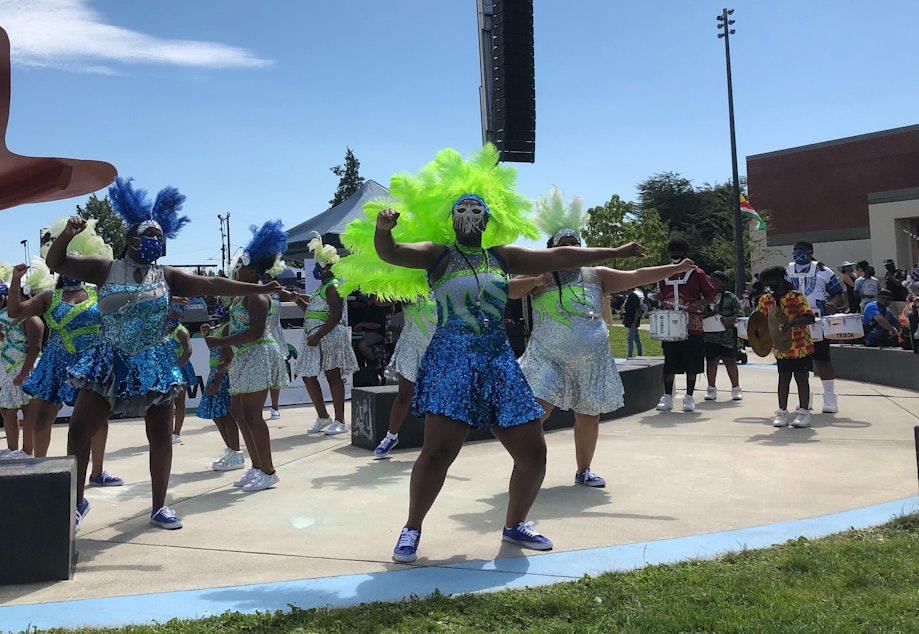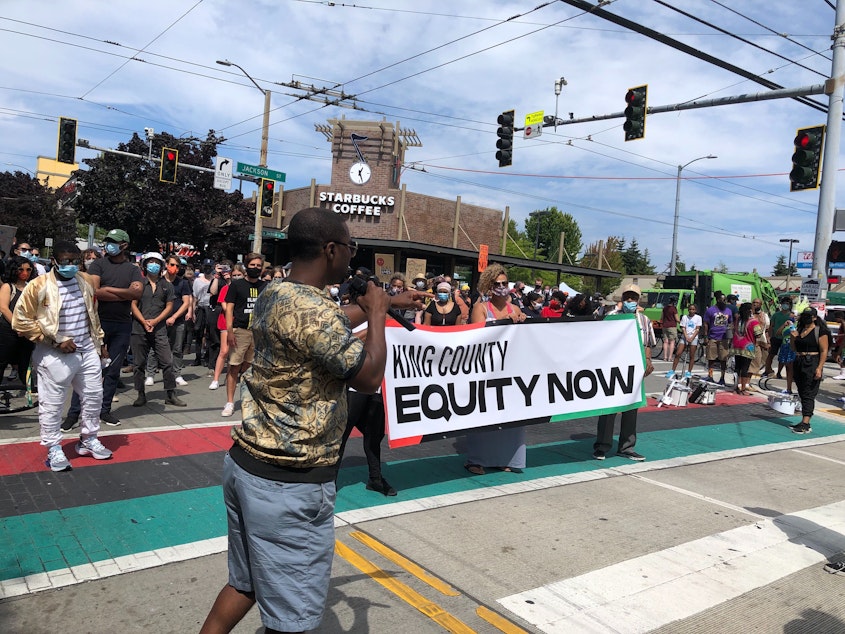Amid pandemic and protests, Umoja Fest offers ‘day of unity’ in Seattle

This year’s Umoja Fest was called a “day of unity for Black lives.” It was shorter than the usual festival, and marked with a sense of urgency about racial equity. But amid the pandemic, people savored the rare chance to celebrate as a community.
People marched through Seattle’s Central District to Jimi Hendrix Park at this year’s Umoja Fest on Saturday. Wyking Garrett, the president of Africatown and a member of King County Equity Now, stopped along the way to demand changes for Black residents, employees and businesses being displaced.
“Divest, reinvest. We need Black ownership at 23rd & Jackson,” he said. “Equity Now means land, access to capital to develop so we can have our business, so we can live, so people can have ownership,” Garrett said.
For the Washington Diamonds drill team and drum line, director Fawn Sterling said Saturday’s parade and march was finally an opportunity to show off their skills.
“When Umojafest said we can come and perform, this is probably going to be our only parade of the season – this is amazing.”
She said a normal season would include about 20 performances with Seafair as the highlight. Sterling said the all-ages group was thrilled when she called them back to practice.
“They just love it. They were so happy when I said, ‘let’s do it,’” she said. “We’re more than a drill team, we’re a family.”

At the park, people said they came especially to support the Black Lives Matter movement.
Kilon Peden said she came out "for the unity, to see all different cultures and ethnicities come together as one."
"Especially with the culture of things going on around here in Seattle with the different protests,” she said. “It’s nice to see everyone come together in a positive manner.”
Peden said the festival had a similar feeling to the peaceful rallies she’s attended lately, against police brutality and supporting “equality for ethnic people, Black, brown-skinned; that’s pretty much my main focus when it comes to protesting.”
Tajuan LaBee said he missed the festival for the last few years.
“It’s good to be back,” he said. “Definitely now the times call for it,” LaBee said.
He supports the movement for reparations, as well as a focus on Black lives.
“I felt it was important to come to Umoja Fest especially this time where they’re having another sit-in to try to get the African American Heritage Museum and Cultural Center reestablished in place of what they have here now,” he said.
People taking part in the sit-in have erected tents outside the entrance of the Northwest African American Museum in the Colman school building. That museum is currently closed due to the pandemic.
Giorgio Brown wore a face mask and said the coronavirus was definitely on everyone's minds, but he was still glad to be there and to see the turnout.
“A lot of the people are wearing masks, most of the people, and that’s a good thing," Brown said. "We are paying attention to what’s going on, but you just need this energy and the sunshine sometimes, you know?”
On the property’s wall facing 23rd Avenue South, artist Melvin Freeman discussed his recently completed artwork, which includes collages of historic photos of neighborhood residents, to form the words “Central District. He said the sign is a token of his love for the neighborhood.
“You always see all these things that say ‘Squire Park,’ ‘Welcome to Leschi,’ ‘Welcome to Madrona’ – but this is the Central District and I wanted to mark the spot!” Freeman said. “All these faces on the wall – it’s the real District right there.”
Wyking Garrett said the image of water flowing behind and around the letters represents the continuity of the Black community in the neighborhood, and their commitment to be part of the city’s future as well as its past.
“We’re gonna keep the flow going,” he said. “Because Umoja Fest is the continuation of the flow of the Black Community Festival, of the East Madison Mardis Gras that started in the 40s. So let’s go flow, ya’ll,” he said, leading the way into the park.

